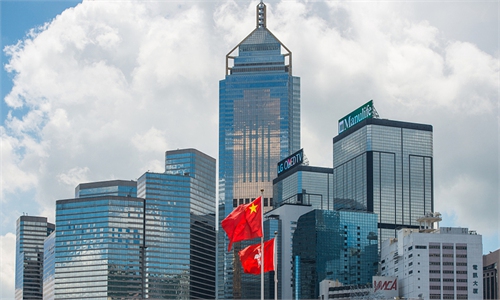ARTS / CULTURE & LEISURE
Hong Kong film industry will fly again with mainland’s full support

Photo: VCG
After three years of the pandemic, the 41st Hong Kong Film Awards made a great return on Sunday. Although the number of nominations in the competition this year was relatively small, there were many good works. This signifies the resilience of Hong Kong's film market as well as the vitality it can achieve with the full support of the mainland.The awards were full of surprises: Sammi Cheng finally realized her dream of winning with her seventh nomination.
"For me, this award was both far away and only one step away… The road to pursuing one's dreams is difficult, but I hope you stick to it. Remember this picture, dreams are for those who never give up," she said.
Fung Woo, 91, won a lifetime achievement award. Since his debut in 1953, he has performed in more than 100 films and television works. He encouraged his young colleagues to "continue to break out of Asia and go global with your efforts, and shine in the future!"
Many filmmakers have been trying their best to break Hong Kong films out of Asia and into the world. So when the Oscar-winner Michelle Yeoh appeared, it became the night's biggest highlight. Yeoh, who has acted in Hong Kong films for almost 20 years, encouraged everyone to never give up, saying that "if we fight, work hard and persist, our dreams will come true."
Derek Yee, chairman of the awards, said that the awards would encourage the production high-quality films and resume the brilliance of the Hong Kong films.
When the Hong Kong film industry suffered from a decline due to a lack of fresh themes in the late 1990s, it was looking for a way out. It was not until the Chinese mainland market opened up that it had obtained that opportunity.
In 2003, the Closer Economic Partnership Arrangement (CEPA) between the Chinese Mainland and Hong Kong was signed, which is widely regarded as a turning point for the Hong Kong film industry.
After the CEPA was implemented in 2004, some co-productions were released simultaneously in both the mainland and Hong Kong. Hong Kong can cooperate with the mainland in diverse forms of film cooperation, such as themes, productions, actors and capital. While the mainland provides the subject matter, the Hong Kong filmmakers can create the genre. And what could be better than the mainland market of 1.4 billion people?
Furthermore, the Development Plan Outline of the Guangdong-Hong Kong-Macao Greater Bay Area issued in 2019 was another step forward for Hong Kong films after the CEPA agreement. According to the outline, Hong Kong should give full play to its advantages in film and television talents, promote cooperation in film and television between Guangdong, Hong Kong and Macao, and strengthen cooperation in film investment and personnel exchanges.
Therefore, the resurgence of Hong Kong films cannot be achieved without the strong support of the Chinese mainland. With the continuous development of the Guangdong-Hong Kong-Macao Greater Bay Area, Hong Kong film industry will surely rebuild its glory on the basis of its past, and tell more and better Chinese stories in the future.


